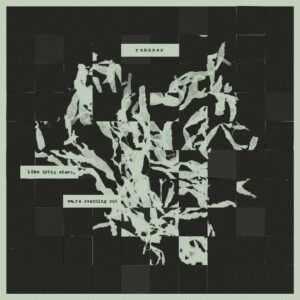Foto-© Run For Cover Records
Die letzten fünf Jahre war der in LA heimische Musiker Noah Weinman alles andere als untätig – ob mit seinem eigenen musikalischen Alter Ego Runner, mit dem er seine Song-Ansammlung Always Repeating 2021 veröffentlichte und seitdem an seinem Debütalbum arbeitete oder als Produzent der Skullcrusher Werke, es gab immer etwas zu tun. Doch die Arbeit hat sich gelohnt, sein eigenes, sehr vielschichtiges Debüt Like Dying Stars, We’re Reaching Out steht ab dem 17. Februar in den Läden und wir trafen uns für einen Zoom-Call mit Weinman zum Gespräch, um mehr über ihn, das Album und sein Projekt Runner zu erfahren! Unser Interview!
 There’s a different sense of unrest on Like Dying Stars, We’re Reaching out compared with Always Repeating. That album was largely about not being settled and moving around a lot, where is this one is a lot more about boredom and language. Can you talk a little bit about the difference in context between the two?
There’s a different sense of unrest on Like Dying Stars, We’re Reaching out compared with Always Repeating. That album was largely about not being settled and moving around a lot, where is this one is a lot more about boredom and language. Can you talk a little bit about the difference in context between the two?
Always Repeating is a compilation so it wasn’t as curated in terms of being one theme, but a lot of those songs were written at this time where I was unsure of where I wanted to live and put my roots down (not that I’ve put long term roots down now). I felt restless and torn and it felt really isolating because I was drifting through these spaces with a lot of people, but I wasn’t ever there long enough to feel like a part of it. For Dying Stars, it was me feeling more settled in a geographical place, but then feeling unsettled in the relationships I was putting more time into and I felt like I was noticing the limits to my communication. And how much the pandemic made that worse because I was realising that so much of direct communication relies on more than the words that we say to each other. Even in a text message or something you say over the phone, it all carries a bit more weight. I was in a relationship at the time and when you spend that much time with one person you really unpack the ways that you communicate every day. Always Repeating was a way for me to try to situate myself in space and Dying Stars is an attempt to situate myself in relationships and communication. I’m pretty conflict averse and I don’t always say what’s on my mind and I’m trying to get better at that.
Let’s talk about production. You do a lot of fun stuff with production and particularly with banjo on ‘Raincoat’ and ‘Noah Needs a Haircut’ – which producers are you influenced by and what kind of aims and approaches do you have to production?
I used to produce music to try and get it to sound like the songs would when I would play them with a band, and I hated that because I wasn’t a good enough producer to capture that fullness. So, I flipped it on its head when I started the Runnner project. With the small resources I have I throw whatever I can into the track and there are no rules. There is a lot of digital manipulation. I use Ableton which is becoming way more popular among musicians. In terms of production influences, I’ve always been drawn to producer-artists that do both at the same time and that are always looking for a way to mirror what a traditionally produced song might do but with elements that you haven’t heard before. A big album that I was listening to while I was making Dying Stars is Lost and Safe by The Books. They will just put whatever they want in the song and not necessarily worry about how it sounds, or whether it is too unfamiliar. I heard Nick Zammuto talk on Song Exploder and he said that every stringed instrument he plays, he invents a tuning for, because if he leaves it in a standard tuning or common alternate tuning, every chord feels like a chord that someone has already played before. I don’t approach guitar that way, but I approach certain tones that way. I don’t love most synth sounds that I can just make from my synth so instead what I’ll do is take a long note from a saxophone or something and throw it into Ableton and pitch it around and build a synth out of that. Within that process there are a lot more ways for things to go wrong accidentally and when that happens it opens the door for me to explore new sounds that I wouldn’t have come across otherwise. I try to make space for that weirdness and randomness. The other big producers for me are Phil Elverum, Chris Walla and Justin Vernon.

Perhaps because you are a bit more settled, there is an extra layer of homeliness that comes with field recording, or just recording candid sound at home, particularly at the end of ‘Plexiglass’. What do you think your relationship is to everyday sounds and what was the thought behind including some of those recordings on the album?
The ones at the end of ‘Plexiglass’ are voicemails. I love everyday sounds. My only non-Runnner album on Spotify is under the name Nnnoah and the album is called Guitar Outside. It’s an acoustic ambient album that has a lot of outside sounds. I’m going to do some La Blogotheque videos and they will be outside. We will do the song and at the end the sounds of the world around me will seep into the track. The voicemails are a metaphor for communication that is directed towards me that I can’t respond to. I like what that represented. I really hate talking on the phone because I think too much about what I’m saying, and I don’t listen enough.
A few months ago, I was speaking to Frankie Cosmos about the current trend in DIY indie rock of food-based lyricism. We picked some of our favourite food-based lyrics from songs by MJ Lenderman, Another Michael, Pinegrove, Friendship, and her. You have written a song literally called ‘I Only Sing About Food’… what is your theory behind this? What is your song trying to get at? I think we should organise a compilation album. Maybe I’ll do a radio show or something. What does the food lyric mean to you?
That’s interesting, I haven’t noticed that. Food has always been one of my favourite things to write about. When I was in school and doing creative writing, I didn’t care much about plot or story, I just wanted to do description. My favourite things to describe are sound and food. It’s redundant to be in a song and describing sound. Some people do it really well, but I don’t think I’m any good at it. But food I’ve always been drawn to. My mum is a chef, so food has always been significant in my life. A lot of my approach to song writing is to focus in on what is often overlooked. And food can often be one of those things. When I’m writing a song, I’m imagining a scene and I’m trying to convey as many of the small details as possible from that frame. I always gravitate towards food because it is tactile and mundane as well as everywhere. The kinds of food you eat with different people says a lot about your relationship with them. There is a reference to coffee in ‘I Only Sing About Food’ but it’s more a song about songs than it is about food. Up until that point I had ‘Monochrome’ which has the chicken line, and ‘Eggshell’, and ‘Your Name on a Grain of Rice’. I was thinking about the ways that I hide behind humour and other devices such as food that obscure what I’m actually trying to say. I do think about death way more than I think about food but yet I’m communicate at this level when I want to be communicating at a different level.
 You end the album with nodding, which is sort of an extra-linguistic signifier. Do you read much fiction? These seem to me do be sort of literary devices in a way.
You end the album with nodding, which is sort of an extra-linguistic signifier. Do you read much fiction? These seem to me do be sort of literary devices in a way.
The nodding signifies that we don’t always have to make sense to communicate something and that is a freeing realisation. When I’m working on music, I tend to read a lot of short stories because usually it gets my writing brain going. I used to really struggle with song writing because I would try to tell a complete story. When I finally gave myself a break to not be thesis driven or have to prove a point, I was able to write songs that I liked. With short stories I often find it does rely more on interesting used of language that offer a little glimpse into something and then go away. I love Donald Barthelme. He has a story called ‘The Balloon’ which I love. And Miranda July. And then my favourite book is Limber by Angela Pelster, which is a book of essays. Every Runnner thing I’ve ever written is directly influenced by her. I had a fun fanboy moment. It’s her only book and I read it for a class, and it set a light off for me. For this album I decided to go for the cold email, and she ended up writing my bio! Me appearing in her language felt like being drawn into my favourite cartoon or something.
What’s next for you? I know you’re going on tour…how are you feeling about that?
I’m excited and nervous. We are going to play in cities that I’ve never played before. I’m not so sure how many people in these cities are going to come and see us. But it’s what you gotta do. I’m excited to play shows. I really like the band we have to play on this tour. I’m actually working on my first film score for an indie documentary. We’re wrapping the whole thing in February, but I imagine it will be a long time before it sees the light of day.










